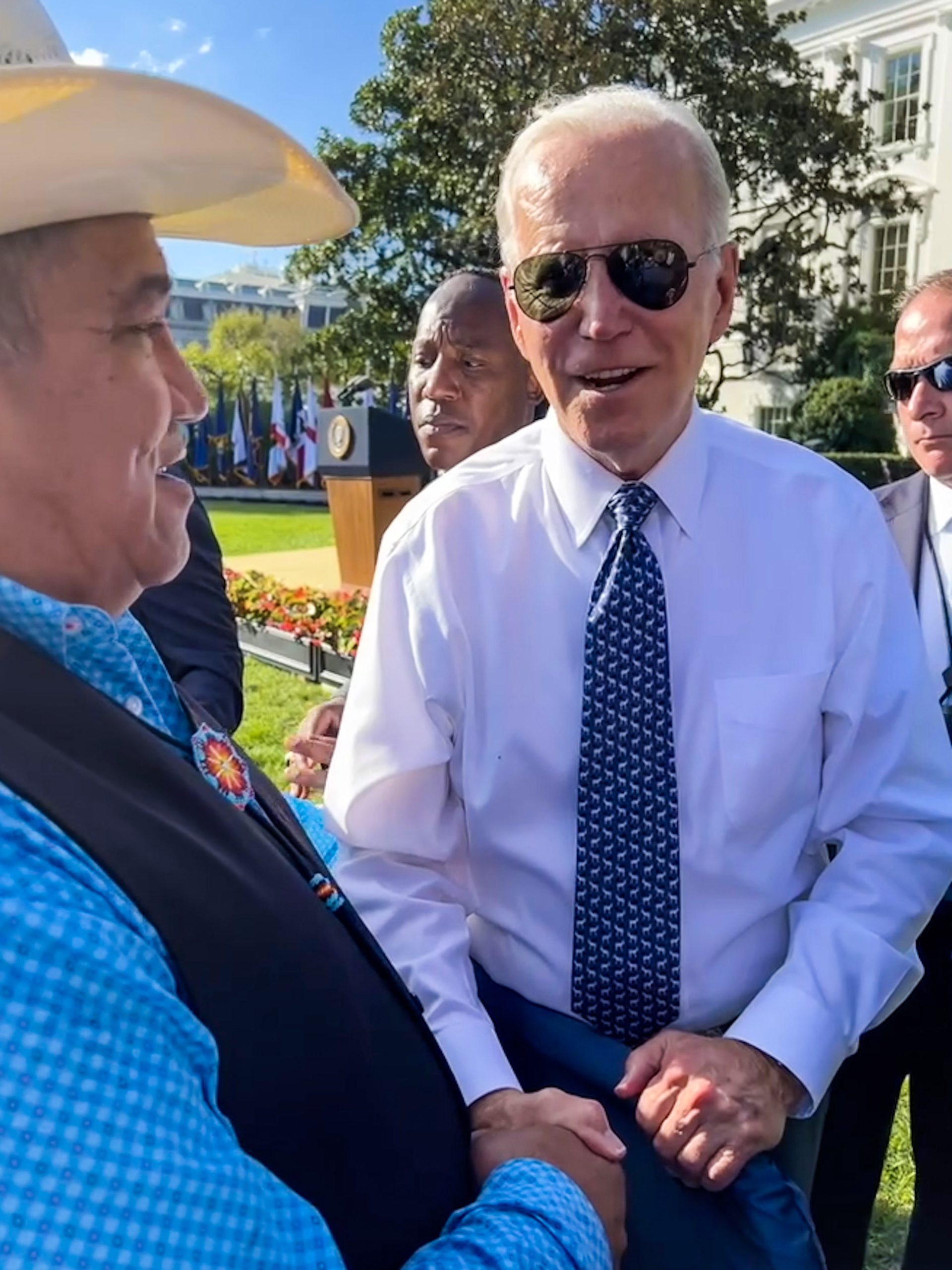Indianz.Com > News > Harold Frazier: Nation-to-nation policy must be law of the land
The Creator’s Gift of Life
Wednesday, November 30, 2022
President, Great Plains Tribal Chairmen’s Association
Lakota know our origin. Wakan Tanka, the Creator, gave the first woman and first man the breath of life and we emerged from Wind Cave in the Heart of the Black Hills, a free and visionary People with a sacred duty to protect Unci Maka, Grandmother Earth.
Native Sovereign Nations are prior sovereigns, embodying the inalienable and inherent rights of Native Peoples bestowed by our Creator. Our grandfathers and grandmothers put their minds together to see what lives they could make for the wakanyejea, the Creator’s sacred gifts: our children and grandchildren. The Circle of the Beloved, Circle of Relatives is the foundation of our democracy. Lakota means Friends. Neighbors came among us. Through generosity and kindness, we adopted relatives to bring them into the Circle of Friendship. Mitakuye Oyasin means “we are all related.”
Native Nation origins are prior to America. The 1805 Treaty with Sioux Nation of St. Peter’s and St. Paul’s Rivers extended Sioux Nation recognition to American sovereignty over two 10 square mile tracts, at America’s request. We reserved our rights to use the lands. The Federally Recognized Tribe List Act acknowledges inherent sovereignty as the touchstone of nation-to-nation relations. We are not subordinate to state law.
As the 14th Amendment was sent to the states for adoption and ratification from 1866 to 1868, America’s Indian Peace Commission negotiated the peaceful end of the Powder River War. By acknowledging Native Nation’s primary jurisdiction over Native citizens, the 14th Amendment affirmed our treaty. Maintaining the constitutional recognition and self-governing status of “Indians not taxed,” the 14th Amendment affirms our nation-to-nation relations with America. Today, the Supreme Court ignores the express mandates of the Constitution: claiming that Congress has a unilateral right to do away with our Native Sovereign Nations at any time. Genocide, by definition, is the attempt by one people to do away with another — the Supreme Court’s doctrine is genocidal. In the 19th Century, Genocide was justified as the White Man’s Burden to “civilize” the Vanishing American. The Roberts Court should be ashamed to say these words as America supports Ukraine’s fight for freedom against Russian tyranny. Nation-to-nation consultation must build policies and progress based upon mutual consent. The U.S. Constitution mandates nation-to-nation treaties made by mutual consent. America’s Organic Acts call for treaties and articles with the Indian nations “based on mutual consent.” The Declaration of Independence announces that rights to life, liberty and pursuit of our sacred visions are the original, inherent, and inalienable gifts of our Creator, who bestowed the Breath of Life upon our Native Peoples. “We hold these truths to be self-evident….” America’s nation-to-nation relations are based upon mutual consent between nations. In 1970, President Nixon declared an end to the Termination Policy and the return to the Indian Self-Determination Policy. Fifty years later, Congress must catch up — enshrine the Nation-to-Nation Policy in law. Native Americans are America’s fastest growing natural born population. It’s time to honor the Constitution and recognize our prior human rights to Self-Determination. Today, we trust President Joe Biden to reaffirm the nation-to-nation relations between America and our Native Sovereign Nations, just as President George Washington did for America in his time.ICYMI: President Joe Biden promised to visit Indian Country next year during remarks at the 2022 White House Tribal Nations Summit.
— indianz.com (@indianz) November 30, 2022
Listen to his speech at #TribalNationsSummit, with an introduction by Secretary of the Interior Deb Haaland. #WHTNShttps://t.co/uV69QCs9Ww pic.twitter.com/nXwO5d31TS
Harold Frazier is concluding his second consecutive term as chairman of the Cheyenne River Sioux Tribe, an Indian nation based in South Dakota. He also serves as president of the Great Plains Tribal Chairmen’s Association, representing Indian nations in Nebraska, North Dakota and South Dakota. He previously served as chair and vice chair of his tribe. He currently serves as a regional vice president for the National Congress of American Indians.
Search
Filed Under
Tags
More Headlines
Native America Calling: New post office rule is among potential hurdles for Native voters
Native America Calling: Remembering Ben Nighthorse Campbell and Harvey Pratt
President Trump vetoes tribal homelands bill with swipe at trust relationship
Native America Calling: The Pleiades star cluster ushers in winter story season
NAFOA: 5 Things You Need to Know This Week (January 5, 2026)
Native America Calling: Native in the Spotlight with Elaine Miles
Native America Calling: Gearing yourself up for 2026
Statement: Chairman of Miccosukee Tribe on veto of homelands bill
Native America Calling: Lumbee Nation secures its sovereign status
Chuck Hoskin: Cherokee Nation builds on tradition with technology
Native America Calling: The Year in Native News
Native America Calling: Native music in 2025
Native America Calling: Amid Greenland’s independence push, Denmark accounts for colonial blunders
Senate Committee on Indian Affairs sets business meeting and hearing
Native America Calling: Saving historic architecture and other important places
More Headlines
Native America Calling: Remembering Ben Nighthorse Campbell and Harvey Pratt
President Trump vetoes tribal homelands bill with swipe at trust relationship
Native America Calling: The Pleiades star cluster ushers in winter story season
NAFOA: 5 Things You Need to Know This Week (January 5, 2026)
Native America Calling: Native in the Spotlight with Elaine Miles
Native America Calling: Gearing yourself up for 2026
Statement: Chairman of Miccosukee Tribe on veto of homelands bill
Native America Calling: Lumbee Nation secures its sovereign status
Chuck Hoskin: Cherokee Nation builds on tradition with technology
Native America Calling: The Year in Native News
Native America Calling: Native music in 2025
Native America Calling: Amid Greenland’s independence push, Denmark accounts for colonial blunders
Senate Committee on Indian Affairs sets business meeting and hearing
Native America Calling: Saving historic architecture and other important places
More Headlines

